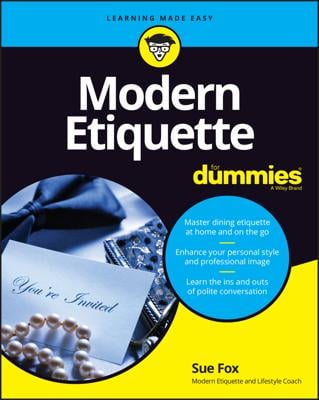Improve your manners, navigate uncomfortable social situations, and show greater kindness to others
Our world is constantly changing, but something that always remains true? Manners matter. Etiquette is about more than just knowing which fork to use at a fancy dinner or how to write a thank-you note. Modern Etiquette For Dummies shows you how to navigate tricky interpersonal scenarios and tough workplace dilemmas with ease. With the help of Dummies, you'll toss aside stuffy old notions of etiquette and discover how to conduct yourself in various environments. This book is full of helpful tips on tackling today's unique challenges, including how to use the right pronouns, how to behave on social media, how to maintain professionalism in hybrid work settings (like when is it okay to turn off your camera during a Zoom meeting?), and how to put your phone down so you can focus on what matters.
- Learn important social expectations in informal, formal, and workplace settings
- Discover how to navigate pronouns when unsure of someone's gender identity
- Get up to date on the etiquette surrounding remote work, video calls, and more
- Improve your reputation and communicate better with friends and family
This Dummies reference is great for anyone who wants improved manners. Entering the business world? Traveling overseas? Hosting a dinner party? This is the book you need.
Improve your manners, navigate uncomfortable social situations, and show greater kindness to others
Our world is constantly changing, but something that always remains true? Manners matter. Etiquette is about more than just knowing which fork to use at a fancy dinner or how to write a thank-you note. Modern Etiquette For Dummies shows you how to navigate tricky interpersonal scenarios and tough workplace dilemmas with ease. With the help of Dummies, you'll toss aside stuffy old notions of etiquette and discover how to conduct yourself in various environments. This book is full of helpful tips on tackling today's unique challenges, including how to use the right pronouns, how to behave on social media,
- Learn important social expectations in informal, formal, and workplace settings
- Discover how to navigate pronouns when unsure of someone's gender identity
- Get up to date on the etiquette surrounding remote work, video calls, and more
- Improve your reputation and communicate better with friends and family
This Dummies reference is great for anyone who wants improved manners. Entering the business world? Traveling overseas? Hosting a dinner party? This is the book you need.

